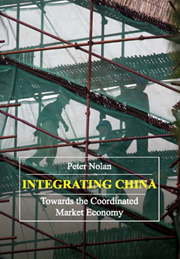Book contents
- Frontmatter
- Contents
- Acknowledgements
- Foreword
- 1 Reflections on 4th June 1989
- 2 The Global Business Revolution and Developing Countries
- 3 The Globalisation Challenge and the Catch-up of Developing Countries: The Case of the Brewing Industry
- 4 The Global Industrial Consolidation and the Challenge for China: The Case of the Steel Industry
- 5 China in the Asian Financial Crisis: ‘Cutting the Trees to Save the Forest’
- 6 China at the Crossroads
- 7 Capitalism and Freedom: The Contradictory Character of Globalisation
- 8 Capitalism, Conflict and Cooperation: US-China Relations under Capitalist Globalisation
- Index
1 - Reflections on 4th June 1989
Published online by Cambridge University Press: 05 March 2012
- Frontmatter
- Contents
- Acknowledgements
- Foreword
- 1 Reflections on 4th June 1989
- 2 The Global Business Revolution and Developing Countries
- 3 The Globalisation Challenge and the Catch-up of Developing Countries: The Case of the Brewing Industry
- 4 The Global Industrial Consolidation and the Challenge for China: The Case of the Steel Industry
- 5 China in the Asian Financial Crisis: ‘Cutting the Trees to Save the Forest’
- 6 China at the Crossroads
- 7 Capitalism and Freedom: The Contradictory Character of Globalisation
- 8 Capitalism, Conflict and Cooperation: US-China Relations under Capitalist Globalisation
- Index
Summary
Introduction
The killing of hundreds, perhaps even thousands, of civilians by armed forces in Peking on June 4th 1989 is to be deeply deplored. Such violence is a sign of political failure. However, after the initial emotional shock, one has to attempt to analyse the event coolly to understand why it happened, to consider its significance and anticipate its impact on the future course of China's political economy. The broad thesis of this chapter is that, awful as this event was, it should not have surprised anyone familiar with the political economy of developing countries, especially those observers with more than a superficial knowledge of China. The recent history of virtually all developing countries contains examples of violence by the state against its own citizens. Not even the advanced capitalist countries have been immune in recent times from such actions, albeit on a smaller scale than in China (Kent State and ‘Bloody Sunday’ spring readily to mind). Not only do China's leaders have to deal with the conflicts characteristic of developing countries in general, but also they are presiding over the turbulent process of de-Stalinisation of their entire system of political economy. Such a process is difficult enough in the relatively advanced, urbanised societies of Eastern Europe. In a backward, hugely populous country with vast regional differences, such as China, the process is incomparably more difficult. The realities of China before June 4th were far removed from the fantasy image created by the Western media and observed through the darkest of glasses by Western tourists insulated in almost every way from the true condition of the Chinese people.
- Type
- Chapter
- Information
- Integrating ChinaTransition into Global Economy, pp. 1 - 18Publisher: Anthem PressPrint publication year: 2007

